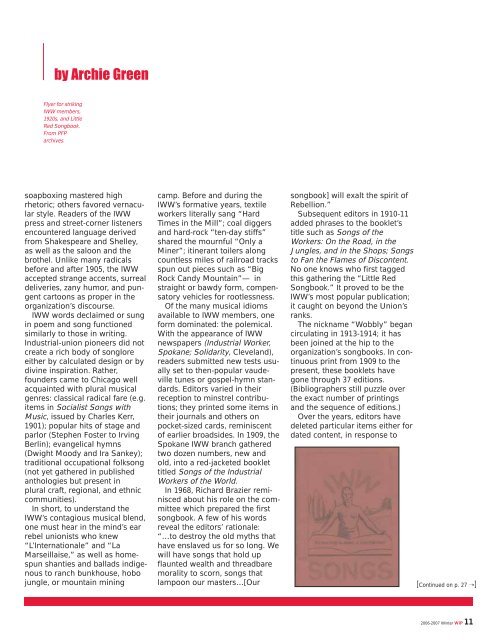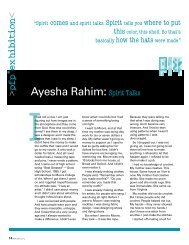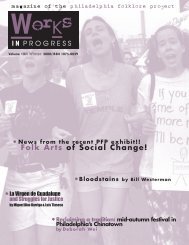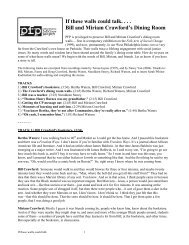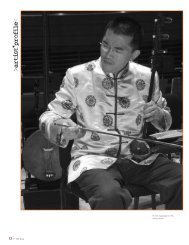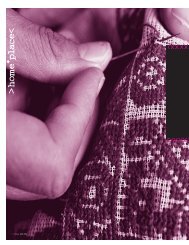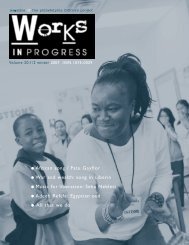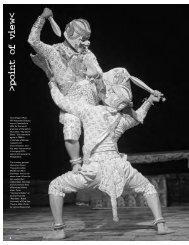The Big Red Songbook: - Philadelphia Folklore Project
The Big Red Songbook: - Philadelphia Folklore Project
The Big Red Songbook: - Philadelphia Folklore Project
You also want an ePaper? Increase the reach of your titles
YUMPU automatically turns print PDFs into web optimized ePapers that Google loves.
y Archie Green<br />
Flyer for striking<br />
IWW members,<br />
1920s, and Little<br />
<strong>Red</strong> <strong>Songbook</strong>.<br />
From PFP<br />
archives.<br />
soapboxing mastered high<br />
rhetoric; others favored vernacular<br />
style. Readers of the IWW<br />
press and street-corner listeners<br />
encountered language derived<br />
from Shakespeare and Shelley,<br />
as well as the saloon and the<br />
brothel. Unlike many radicals<br />
before and after 1905, the IWW<br />
accepted strange accents, surreal<br />
deliveries, zany humor, and pungent<br />
cartoons as proper in the<br />
organization’s discourse.<br />
IWW words declaimed or sung<br />
in poem and song functioned<br />
similarly to those in writing.<br />
Industrial-union pioneers did not<br />
create a rich body of songlore<br />
either by calculated design or by<br />
divine inspiration. Rather,<br />
founders came to Chicago well<br />
acquainted with plural musical<br />
genres: classical radical fare (e.g.<br />
items in Socialist Songs with<br />
Music, issued by Charles Kerr,<br />
1901); popular hits of stage and<br />
parlor (Stephen Foster to Irving<br />
Berlin); evangelical hymns<br />
(Dwight Moody and Ira Sankey);<br />
traditional occupational folksong<br />
(not yet gathered in published<br />
anthologies but present in<br />
plural craft, regional, and ethnic<br />
communities).<br />
In short, to understand the<br />
IWW’s contagious musical blend,<br />
one must hear in the mind’s ear<br />
rebel unionists who knew<br />
“L’Internationale” and “La<br />
Marseillaise,” as well as homespun<br />
shanties and ballads indigenous<br />
to ranch bunkhouse, hobo<br />
jungle, or mountain mining<br />
camp. Before and during the<br />
IWW’s formative years, textile<br />
workers literally sang “Hard<br />
Times in the Mill”; coal diggers<br />
and hard-rock “ten-day stiffs”<br />
shared the mournful “Only a<br />
Miner”; itinerant toilers along<br />
countless miles of railroad tracks<br />
spun out pieces such as “<strong>Big</strong><br />
Rock Candy Mountain”— in<br />
straight or bawdy form, compensatory<br />
vehicles for rootlessness.<br />
Of the many musical idioms<br />
available to IWW members, one<br />
form dominated: the polemical.<br />
With the appearance of IWW<br />
newspapers (Industrial Worker,<br />
Spokane; Solidarity, Cleveland),<br />
readers submitted new tests usually<br />
set to then-popular vaudeville<br />
tunes or gospel-hymn standards.<br />
Editors varied in their<br />
reception to minstrel contributions;<br />
they printed some items in<br />
their journals and others on<br />
pocket-sized cards, reminiscent<br />
of earlier broadsides. In 1909, the<br />
Spokane IWW branch gathered<br />
two dozen numbers, new and<br />
old, into a red-jacketed booklet<br />
titled Songs of the Industrial<br />
Workers of the World.<br />
In 1968, Richard Brazier reminisced<br />
about his role on the committee<br />
which prepared the first<br />
songbook. A few of his words<br />
reveal the editors’ rationale:<br />
“…to destroy the old myths that<br />
have enslaved us for so long. We<br />
will have songs that hold up<br />
flaunted wealth and threadbare<br />
morality to scorn, songs that<br />
lampoon our masters…[Our<br />
songbook] will exalt the spirit of<br />
Rebellion.”<br />
Subsequent editors in 1910-11<br />
added phrases to the booklet’s<br />
title such as Songs of the<br />
Workers: On the Road, in the<br />
Jungles, and in the Shops; Songs<br />
to Fan the Flames of Discontent.<br />
No one knows who first tagged<br />
this gathering the “Little <strong>Red</strong><br />
<strong>Songbook</strong>.” It proved to be the<br />
IWW’s most popular publication;<br />
it caught on beyond the Union’s<br />
ranks.<br />
<strong>The</strong> nickname “Wobbly” began<br />
circulating in 1913-1914; it has<br />
been joined at the hip to the<br />
organization’s songbooks. In continuous<br />
print from 1909 to the<br />
present, these booklets have<br />
gone through 37 editions.<br />
(Bibliographers still puzzle over<br />
the exact number of printings<br />
and the sequence of editions.)<br />
Over the years, editors have<br />
deleted particular items either for<br />
dated content, in response to<br />
[Continued on p. 27 ➝]<br />
2006-2007 Winter WIP 11


